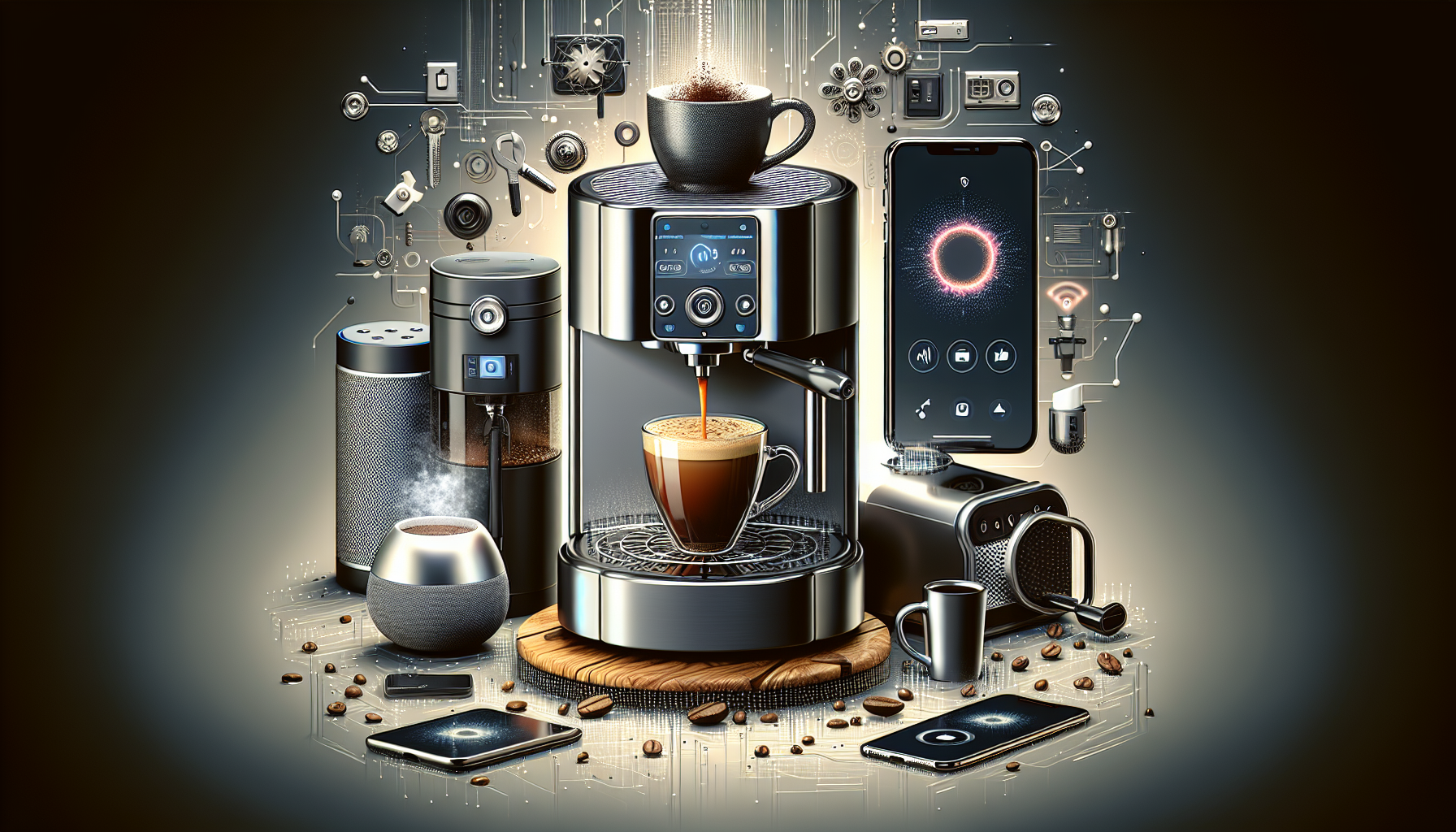At HopaCoffee.com, we are passionate about providing you with the best coffee experience possible. That’s why we have carefully curated a selection of premium coffee blends and flavors, guaranteed to invigorate your mornings and satisfy your coffee cravings. But, did you know that coffee goes beyond just being a delicious beverage? It has a deep connection to technology, and in this article, we will explore the fascinating relationship between coffee and the advancements in technology that have shaped the way we enjoy our daily cup of joe. Get ready to sip on some knowledge as we take a journey through the intertwined worlds of coffee and technology.

The History of Coffee
Origins of Coffee
Coffee’s journey begins in Ethiopia, where it is believed to have been discovered by a goat herder named Kaldi. Legend has it that Kaldi noticed his goats becoming energized after eating the berries from a certain tree. Intrigued, he tried them himself and experienced a similar burst of energy. This discovery eventually led to the cultivation of coffee plants.
Spread of Coffee Cultivation
From Ethiopia, coffee cultivation spread to the Arabian Peninsula, particularly Yemen. The Arabians were the first to cultivate coffee plants and roast the beans to unlock their flavors. Coffee then made its way to the Ottoman Empire, where it gained popularity as a drink and was introduced to Europe during the Renaissance.
Development of Coffee Roasting and Brewing
As coffee spread across the world, different brewing methods and roasting techniques emerged. In the 19th century, French and Italian roasting styles gained prominence, with the former yielding lighter roasts and the latter producing darker, bolder flavors. Brewing methods evolved as well, with the invention of percolators and espresso machines.
Modern Coffee Industry
Today, the coffee industry has become a global phenomenon. It has grown into a major commodity, with countries like Brazil, Colombia, and Vietnam leading in coffee production. The modern coffee industry encompasses everything from small, artisanal coffee shops to large multinational corporations. The demand for specialty coffee and unique flavors continues to drive innovation and advancements in the coffee world.
Coffee in the Digital Age
Online Coffee Orders and Delivery
In the digital age, ordering coffee has become more convenient than ever before. Online platforms allow us to browse through a wide range of coffee options and have our favorite blends delivered right to our doorstep. Whether it’s a subscription service or a one-time purchase, the ease of online coffee ordering has made it easier for us to enjoy our favorite brews without leaving the comfort of our homes.
Mobile Apps for Finding Coffee Shops
Finding a coffee shop wherever we go is made simple with the help of mobile apps. These apps provide us with information about nearby coffee shops, their ratings, and reviews from other coffee enthusiasts. Some apps even offer features like pre-ordering and loyalty programs, making the coffee shop experience more convenient and rewarding.
Smart Coffee Machines and Devices
Smart technology has revolutionized the way we brew our coffee at home. Smart coffee machines and devices can be controlled remotely through mobile apps, allowing us to customize brewing parameters and schedule our coffee to be ready as soon as we wake up. These devices often come with built-in scales, timers, and even latte art capabilities, truly enhancing our coffee brewing experience.
Internet of Things (IoT) and Coffee
The Internet of Things (IoT) has found its way into the coffee world as well. IoT-enabled coffee machines and accessories can connect to our home network and interact with other smart devices. For example, we can use voice commands through virtual assistants to brew coffee or integrate our coffee brewing routines with other smart home automation systems. This seamless integration of technology enhances convenience and personalization in our coffee rituals.
Impact of Technology on Coffee Quality
Coffee Farming Techniques and Technology
Technology has greatly influenced coffee farming techniques, improving productivity and quality. Precision agriculture techniques, such as satellite imaging and drones, help farmers monitor the health of their crops and optimize irrigation and fertilization. Additionally, advancements in genetic research have allowed for the development of disease-resistant coffee varieties, ensuring the sustainability and stability of the coffee industry.
Coffee Roasting and Grinding Technology
Roasting and grinding are crucial steps in the coffee production process, and technology has played a significant role in improving these aspects. Roasters now use computer-controlled systems to monitor and adjust temperature, airflow, and roasting profiles, resulting in consistent and precise roasts. Grinding technology has also evolved, with advanced grinders capable of producing uniform particle sizes for optimal extraction and flavor.
Brewing Methods and Innovations
From traditional brewing methods to modern espresso machines, technology has transformed the way we brew our coffee. Automatic drip coffee makers allow for precise control over brewing time and temperature, while espresso machines with built-in pressure profiles produce cafe-quality shots. Innovations such as cold brew systems, pour-over stands, and espresso capsules offer even more options for coffee lovers to explore different brewing styles and flavors.
Coffee Quality Monitoring and Control
Technology has made it easier to monitor and control the quality of coffee throughout the production and distribution process. Data analytics and sensors help detect any inconsistencies or defects in coffee beans, ensuring only the highest quality beans make it to the market. Additionally, tracking systems can trace the origin of each coffee batch, promoting transparency and accountability in the industry.
Coffee and E-commerce
Coffee Subscription Services
Coffee subscription services have gained popularity in recent years, offering a convenient way to discover new coffee flavors and receive regular deliveries. Subscribers can choose from various subscription models, receiving different coffee blends, single-origin beans, or limited edition releases. These services often provide tasting notes and brewing recommendations, allowing us to explore the world of coffee from the comfort of our own homes.
Virtual Coffee Tastings
Virtual coffee tastings have become a trend in the coffee community, especially during periods of social distancing. Through video conferencing platforms, coffee enthusiasts can participate in guided tastings led by industry experts. These tastings allow us to learn about the nuances of different coffee profiles and engage in discussions with other participants, creating a sense of community even in a virtual setting.
Online Coffee Communities
The rise of social media and online platforms has given birth to vibrant coffee communities. These communities bring together coffee enthusiasts from around the world, allowing us to share our love for coffee, exchange brewing tips, and learn from experts. Online forums, blogs, and social media groups provide a space for us to connect, ask questions, and stay updated on the latest trends in the coffee world.
Social Media Influencers and Coffee
Social media influencers have had a profound impact on the coffee industry, shaping trends and introducing new flavors and brewing methods to a wider audience. Influencers often share their coffee experiences, recipes, and recommendations through platforms like Instagram and YouTube. Their engaging content inspires us to try new brewing techniques, explore different coffee origins, and experiment with exciting flavor combinations.

Tech Tools for Coffee Enthusiasts
Coffee Brewing Apps and Timers
Coffee brewing apps and timers have become essential tools for coffee enthusiasts. These apps provide step-by-step brewing guides, recommend brewing ratios, and offer customizable timers for each brewing method. Some apps even incorporate sensory analysis, helping us track our brewing consistency and refine our skills over time. With these tools, we can brew coffee like a professional barista in the comfort of our own homes.
Coffee Recipe Websites and Apps
Coffee recipe websites and apps offer a treasure trove of brewing recipes and techniques. From classic espresso-based drinks to creative coffee cocktails, these resources guide us through the preparation process, providing detailed ingredient lists, measurements, and brewing instructions. Whether we’re looking to recreate our favorite cafe drinks or experiment with new flavor combinations, these recipe platforms inspire us to get creative in our coffee brewing endeavors.
Coffee Scales and Grinders
Accurate measurements are crucial for a consistent and delicious cup of coffee. Coffee scales enable precision in measuring coffee grounds, ensuring proper brewing ratios and extraction. On the other hand, high-quality coffee grinders produce consistent particle sizes, allowing for even extraction and optimal flavor. Coffee scales and grinders have become essential tools for coffee enthusiasts who value precision and control in their brewing process.
Coffee Brewing Gadgets and Accessories
Coffee brewing gadgets and accessories offer convenience and innovation in our coffee rituals. From portable espresso makers to cold brew systems, these gadgets cater to different brewing preferences and lifestyles. Brewing accessories like pour-over drippers, French presses, and Aeropresses add versatility to our brewing repertoire, allowing us to explore a wide range of flavor profiles and brewing techniques.
Artificial Intelligence and Coffee
AI Coffee Roasting and Blending
Artificial intelligence (AI) has found its way into the coffee roasting and blending process. AI-powered roasting systems can analyze data from sensory evaluations and control roast profiles based on desired flavor outcomes. Similarly, AI algorithms can recommend optimal coffee blends by taking into account the flavor preferences of individual consumers. This integration of AI in coffee production enhances consistency and allows for the creation of tailored coffee experiences.
AI-Generated Coffee Recipes
AI technology can generate coffee recipes by analyzing vast amounts of data on coffee roasting, grinding, brewing, and flavor profiles. These AI-generated recipes offer unique combinations of ingredients and brewing techniques, often pushing the boundaries of conventional coffee brewing. Coffee enthusiasts can experiment with these recipes and discover new flavors and brewing styles that they may have never considered before.
AI-Powered Coffee Recommendations
AI-powered recommendation systems have become increasingly prevalent in the coffee industry. These systems analyze consumer preferences, purchase history, and sensory evaluations to suggest coffee blends and flavors that align with individual tastes. Whether it’s recommending a new single-origin coffee or suggesting a complementary blend for a favorite espresso, AI-powered recommendations enhance our coffee exploration and help us discover new and exciting flavors.
AI-Driven Coffee Research and Development
AI technology has also been utilized in coffee research and development. Machine learning algorithms can analyze vast amounts of coffee-related data, including genetic information, climate conditions, and sensory evaluations, to identify trends and insights. This information can then be used to improve coffee farming techniques, optimize roasting profiles, and create innovative brewing methods. AI-driven research and development hold great potential for future advancements in the coffee industry.

Big Data and Coffee Industry
Data Analysis for Coffee Trends
Big data analytics play a crucial role in understanding coffee trends and consumer preferences. By analyzing data from social media, online platforms, and sales records, the coffee industry can identify emerging trends, popular flavors, and brewing methods. This information guides decision-making in terms of product development, marketing strategies, and supply chain management.
Supply Chain Optimization
The coffee supply chain involves various stakeholders, from coffee farmers to exporters, importers, roasters, and retailers. Big data analytics can optimize this complex supply chain by providing real-time insights into factors such as inventory management, logistics, and demand forecasting. With better visibility and understanding of the supply chain, coffee companies can minimize waste, reduce costs, and ensure a steady supply of high-quality coffee.
Predictive Analytics for Coffee Demand
Predicting coffee demand accurately is crucial for ensuring a sufficient supply and avoiding shortages or excess inventory. Predictive analytics models can forecast coffee demand based on historical data, market trends, and customer behavior. By analyzing factors such as seasonality, demographics, and social trends, coffee companies can adjust their production and distribution strategies accordingly, optimizing their resources and meeting consumer demand effectively.
Consumer Behavior Insights
Big data provides valuable insights into consumer behavior within the coffee industry. Through data analysis, coffee companies can understand consumer preferences, buying patterns, and brand loyalty. This information helps inform marketing strategies, product development, and customer engagement initiatives, ensuring that coffee companies can better cater to the needs and desires of their target audience.
Coffee Startups and Technology
Innovative Coffee Brewing Devices
Coffee startups have embraced technology to develop innovative coffee brewing devices. These devices often incorporate new brewing methods, materials, and designs to optimize flavor extraction and brewing efficiency. From vacuum brewers to nitrogen-infused cold brew systems, these startups push the boundaries of traditional coffee brewing, creating unique and exciting experiences for coffee enthusiasts.
Tech-Driven Coffee Roasting Techniques
Coffee roasting techniques have evolved with the help of technology-driven innovations. Startups have developed roasting technologies that leverage precise temperature control, airflows, and roasting profiles to achieve consistent and desired flavor profiles. Some startups even utilize infrared technology to roast coffee, providing a different and potentially enhanced flavor experience.
Blockchain for Coffee Traceability
Blockchain technology has found its way into the coffee industry, enabling enhanced traceability and transparency. By recording every step of the coffee supply chain on a distributed ledger, blockchain ensures that all relevant stakeholders can access accurate and tamper-proof information about the origin, quality, and sustainability of the coffee they consume. This technology promotes fair trade practices, encourages ethical sourcing, and builds trust between coffee producers and consumers.
Automated Coffee Shops
Automation and robotics have made their mark in the coffee industry, with automated coffee shops popping up in various locations. These coffee shops utilize robotics to perform tasks such as grinding, brewing, and serving coffee. Customers can place their orders through touchscreen interfaces, and the robots take care of the rest. While these automated coffee shops may lack the human touch, they offer speed, efficiency, and consistent quality.
Environmental Impact and Sustainability
Technology in Coffee Waste Management
Technology plays a crucial role in managing and reducing coffee waste. Advanced waste management systems can convert coffee byproducts, such as coffee grounds and pulp, into valuable resources like fertilizers or biofuels. Additionally, innovative technologies can minimize water usage during coffee processing, reduce energy consumption in roasting and brewing, and optimize packaging to minimize environmental impact.
Energy-Efficient Coffee Machines
Energy-efficient coffee machines contribute to sustainability efforts in the coffee industry. Manufacturers now focus on developing machines that consume less energy during the brewing process, often incorporating features like automatic shut-off and power-saving modes. By reducing energy consumption, coffee machines help mitigate the environmental impact of coffee consumption while still delivering the same great taste.
Smart Water Usage in Coffee Production
Water is a precious resource, and the coffee industry has made efforts to optimize water usage during coffee production. Smart irrigation systems, coupled with data analytics, help coffee farmers monitor soil moisture levels and provide targeted irrigation, minimizing water waste. Water recycling systems in coffee processing facilities enable the reuse of water, reducing water consumption and conserving this vital resource.
Sustainable Packaging Solutions
Packaging plays a significant role in the environmental impact of the coffee industry. Sustainable packaging solutions, such as compostable coffee bags and recyclable materials, are becoming more prevalent. Additionally, advancements in packaging technology aim to extend the shelf life of coffee, reducing the need for excessive packaging or wastage due to spoilage. These sustainable packaging initiatives contribute to reducing the carbon footprint of the coffee industry.
Future of Coffee and Technology
Emerging Technologies in Coffee Industry
The future of coffee holds exciting possibilities as emerging technologies continue to shape the industry. From advancements in coffee extraction methods to the development of new brewing materials, the coffee experience will undoubtedly evolve. Technologies like 3D printing may even revolutionize the design and production of coffee accessories, enabling customization and innovation on a whole new level.
Automation and Robotics in Coffee Production
Automation and robotics are likely to play a larger role in coffee production, further streamlining processes and enhancing efficiency. Robotic arms may take over tasks such as sorting and grading coffee beans, ensuring accuracy and precision. Automated systems may handle the roasting process with minimal human intervention, optimizing temperature control and roasting profiles to achieve consistent and exceptional flavors.
Virtual Reality Coffee Experiences
Virtual reality (VR) has the potential to transform the way we experience coffee. Imagine being transported to a coffee farm, seeing the entire journey from crop to cup in a fully immersive VR experience. VR could also allow us to participate in virtual coffee tastings, exploring flavors and aromas as if we were physically present. These virtual experiences would not only be entertaining but also educational, promoting a deeper understanding and appreciation of coffee.
Blockchain for Fair Trade Coffee
Blockchain technology will continue to shape the coffee industry, particularly in the realm of fair trade practices. Blockchain enables complete transparency and trust by allowing consumers to trace the entire supply chain of their coffee. With blockchain-based systems, consumers can ensure that their coffee purchases support fair trade practices, responsible sourcing, and ethical labor practices. This technology empowers consumers to make informed choices and contribute to a more sustainable and equitable coffee industry.
As technology continues to advance and intertwine with the world of coffee, the possibilities for innovation and improvement are endless. From enhancing convenience in the way we order and brew our coffee to revolutionizing sustainability efforts and promoting fair trade practices, technology plays a pivotal role in shaping the future of the coffee industry. With each new advancement, we can look forward to a more exciting and dynamic coffee experience. So, grab your favorite mug and let’s toast to the incredible connection between coffee and technology. Cheers!

